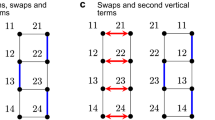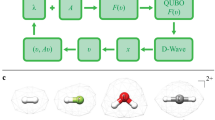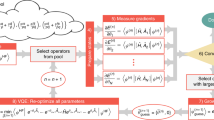Abstract
Quantum computers can be used to address electronic-structure problems and problems in materials science and condensed matter physics that can be formulated as interacting fermionic problems, problems which stretch the limits of existing high-performance computers1. Finding exact solutions to such problems numerically has a computational cost that scales exponentially with the size of the system, and Monte Carlo methods are unsuitable owing to the fermionic sign problem. These limitations of classical computational methods have made solving even few-atom electronic-structure problems interesting for implementation using medium-sized quantum computers. Yet experimental implementations have so far been restricted to molecules involving only hydrogen and helium2,3,4,5,6,7,8. Here we demonstrate the experimental optimization of Hamiltonian problems with up to six qubits and more than one hundred Pauli terms, determining the ground-state energy for molecules of increasing size, up to BeH2. We achieve this result by using a variational quantum eigenvalue solver (eigensolver) with efficiently prepared trial states that are tailored specifically to the interactions that are available in our quantum processor, combined with a compact encoding of fermionic Hamiltonians9 and a robust stochastic optimization routine10. We demonstrate the flexibility of our approach by applying it to a problem of quantum magnetism, an antiferromagnetic Heisenberg model in an external magnetic field. In all cases, we find agreement between our experiments and numerical simulations using a model of the device with noise. Our results help to elucidate the requirements for scaling the method to larger systems and for bridging the gap between key problems in high-performance computing and their implementation on quantum hardware.
This is a preview of subscription content, access via your institution
Access options
Access Nature and 54 other Nature Portfolio journals
Get Nature+, our best-value online-access subscription
$29.99 / 30 days
cancel any time
Subscribe to this journal
Receive 51 print issues and online access
$199.00 per year
only $3.90 per issue
Buy this article
- Purchase on Springer Link
- Instant access to full article PDF
Prices may be subject to local taxes which are calculated during checkout




Similar content being viewed by others
References
National Energy Research Scientific Computing Center 2015 Annual Reporthttp://www.nersc.gov/assets/Annual-Reports/2015NERSCAnnualReportFinal.pdf (2015)
Lanyon, B. P. et al. Towards quantum chemistry on a quantum computer. Nat. Chem. 2, 106–111 (2010)
Du, J. et al. NMR implementation of a molecular hydrogen quantum simulation with adiabatic state preparation. Phys. Rev. Lett. 104, 030502 (2010)
Peruzzo, A. et al. A variational eigenvalue solver on a photonic quantum processor. Nat. Commun. 5, 4213 (2014)
Wang, Y. et al. Quantum simulation of helium hydride cation in a solid-state spin register. ACS Nano 9, 7769–7774 (2015)
O’Malley, P. J. J. et al. Scalable quantum simulation of molecular energies. Phys. Rev. X 6, 031007 (2016)
Shen, Y. et al. Quantum implementation of the unitary coupled cluster for simulating molecular electronic structure. Phys. Rev. A 95, 020501 (2017)
Paesani, S. et al. Experimental Bayesian quantum phase estimation on a silicon photonic chip. Phys. Rev. Lett. 118, 100503 (2017)
Bravyi, S., Gambetta, J. M., Mezzacapo, A. & Temme, K. Tapering off qubits to simulate fermionic hamiltonians. Preprint at https://arxiv.org/abs/1701.08213 (2017)
Spall, J. C. Multivariate stochastic approximation using a simultaneous perturbation gradient approximation. IEEE Trans. Automat. Contr. 37, 332–341 (1992)
Bravyi, S. & Kitaev, A. Fermionic quantum computation. Ann. Phys. 298, 210–226 (2002)
Kempe, J., Kitaev, A. & Regev, O. The complexity of the local Hamiltonian problem. SIAM J. Comput. 35, 1070–1097 (2006)
Abrams, D. S. & Lloyd, S. Simulation of many-body Fermi systems on a universal quantum computer. Phys. Rev. Lett. 79, 2586–2589 (1997)
Aspuru-Guzik, A., Dutoi, A. D., Love, P. J. & Head-Gordon, M. Simulated quantum computation of molecular energies. Science 309, 1704–1707 (2005)
Kitaev, A. Y. Quantum measurements and the Abelian stabilizer problem. Preprint at https://arxiv.org/abs/quant-ph/9511026 (1995)
Farhi, E., Goldstone, J. & Gutmann, S. A quantum approximate optimization algorithm. Preprint at https://arxiv.org/abs/1411.4028 (2014)
Farhi, E., Goldstone, J., Gutmann, S. & Neven, H. Quantum algorithms for fixed qubit architectures. Preprint at https://arxiv.org/abs/1703.06199 (2017)
Yung, M.-H. et al. From transistor to trapped-ion computers for quantum chemistry. Sci. Rep. 4, 3589 (2014)
McClean, J., Romero, J., Babbush, R. & Aspuru-Guzik, A. The theory of variational hybrid quantum-classical algorithms. New J. Phys. 18, 023023 (2016)
Wecker, D., Hastings, M. B. & Troyer, M. Progress towards practical quantum variational algorithms. Phys. Rev. A 92, 042303 (2015)
Romero, J. et al. Strategies for quantum computing molecular energies using the unitary coupled cluster ansatz. Preprint at https://arxiv.org/abs/1701.02691 (2017)
Hutchings, M. et al. Tunable superconducting qubits with flux-independent coherence. Preprint at https://arxiv.org/abs/1702.02253 (2017)
Sheldon, S., Magesan, E., Chow, J. M. & Gambetta, J. M. Procedure for systematically tuning up cross-talk in the cross-resonance gate. Phys. Rev. A 93, 060302 (2016)
McKay, D. C., Wood, C. J., Sheldon, S., Chow, J. M. & Gambetta, J. M. Efficient Z-gates for quantum computing. Preprint at https://arxiv.org/abs/1612.00858 (2017)
McClean, J. R., Schwartz, M. E., Carter, J. & de Jong, W. A. Hybrid quantum-classical hierarchy for mitigation of decoherence and determination of excited states. Phys. Rev. A 95, 042308 (2017)
Li, Y. & Benjamin, S. C. Efficient variational quantum simulator incorporating active error minimisation. Phys. Rev. X 7, 021050 (2017)
Temme, K., Bravyi, S. & Gambetta, J. M. Error mitigation for short depth quantum circuits. Preprint at https://arxiv.org/abs/1612.02058 (2017)
Lanyon, B. P. et al. Universal digital quantum simulation with trapped ions. Science 334, 57–61 (2011)
Bultink, C. C. et al. Active resonator reset in the nonlinear dispersive regime of circuit QED. Phys. Rev. Appl. 6, 034008 (2016)
Spall, J. C. Adaptive stochastic approximation by the simultaneous perturbation method. IEEE Trans. Automat. Contr. 45, 1839–1853 (2000)
Acknowledgements
We thank J. Chavez-Garcia, A. D. Córcoles and J. Rozen for experimental contributions, J. Hertzberg and S. Rosenblatt for room temperature characterization, B. Abdo for design and characterization of the Josephson Parametric Converters, S. Brayvi, J. Smolin, E. Magesan, L. Bishop, S. Sheldon, N. Moll, P. Barkoutsos and I. Tavernelli for discussions, and W. Shanks for assistance with the experimental control software. We thank A. D. Córcoles for edits to the manuscript. We acknowledge support from the IBM Research Frontiers Institute. The research is based on work supported by the Office of the Director of National Intelligence (ODNI), Intelligence Advanced Research Projects Activity (IARPA), via the Army Research Office contract W911NF-10-1-0324.
Author information
Authors and Affiliations
Contributions
A.K. and A.M. contributed equally to this work. J.M.G. and K.T. designed the experiments. A.K. and M.T. characterized the device and A.K. performed the experiments. M.B. fabricated the devices. A.M. developed the theory and the numerical simulations. A.K., A.M. and J.M.G. interpreted and analysed the experimental data. A.K., A.M., K.T., J.M.C. and J.M.G. contributed to writing the manuscript.
Corresponding authors
Ethics declarations
Competing interests
The authors declare no competing financial interests.
Additional information
Reviewer Information Nature thanks N. Linke and the other anonymous reviewer(s) for their contribution to the peer review of this work.
Publisher's note: Springer Nature remains neutral with regard to jurisdictional claims in published maps and institutional affiliations.
Supplementary information
Supplementary Information
This file contains supplementary Text, Supplementary Figures 1-9 and additional references. (PDF 2706 kb)
Rights and permissions
About this article
Cite this article
Kandala, A., Mezzacapo, A., Temme, K. et al. Hardware-efficient variational quantum eigensolver for small molecules and quantum magnets. Nature 549, 242–246 (2017). https://doi.org/10.1038/nature23879
Received:
Accepted:
Published:
Issue Date:
DOI: https://doi.org/10.1038/nature23879
This article is cited by
-
Quantifying the effect of gate errors on variational quantum eigensolvers for quantum chemistry
npj Quantum Information (2024)
-
Quantum many-body simulations on digital quantum computers: State-of-the-art and future challenges
Nature Communications (2024)
-
Understanding quantum machine learning also requires rethinking generalization
Nature Communications (2024)
-
Variational quantum algorithm for experimental photonic multiparameter estimation
npj Quantum Information (2024)
-
Towards near-term quantum simulation of materials
Nature Communications (2024)
Comments
By submitting a comment you agree to abide by our Terms and Community Guidelines. If you find something abusive or that does not comply with our terms or guidelines please flag it as inappropriate.



